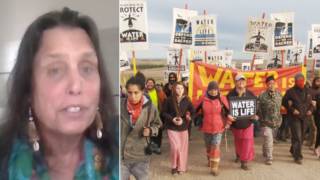
Topics
On Tuesday, Congressmember Sean Duffy of Wisconsin suggested the Green New Deal only served the wealthy. New York Congressmember Alexandria Ocasio-Cortez shot back with a passionate defense of the Green New Deal. We feature her full speech.
Transcript
NERMEEN SHAIKH: Well, on Tuesday, Republican Representative Sean Duffy of Wisconsin suggested the Green New Deal only served the wealthy.
REP. SEAN DUFFY: [I think we should not] focus on the rich, wealthy elites, who will look at this and go, “I love it, because I’ve—I’ve got big money in the bank. Everyone should do this. We should all sign on to it.” But if you’re a poor family just trying to make ends meet, it’s a horrible idea.
NERMEEN SHAIKH: Democratic Representative Alexandria Ocasio-Cortez of New York shot back with a passionate defense of the Green New Deal.
REP. ALEXANDRIA OCASIO-CORTEZ: When we talk about the concern of the environment as an elitist concern, one year ago I was waitressing in a taco shop in Downtown Manhattan. I just got health insurance for the first time a month ago. This is not an elitist issue; this is a quality-of-life issue. You want to tell people that their concern and their desire for clean air and clean water is elitist? Tell that to the kids in the South Bronx, which are suffering from the highest rates of childhood asthma in the country. Tell that to the families in Flint, whose kids have—their blood is ascending in lead levels. Their brains are damaged for the rest of their lives. Call them elitist. You’re telling them that those kids are trying to get on a plane to Davos? People are dying. They are dying.
And the response across the other side of the aisle is to introduce an amendment five minutes before a hearing in a markup? This is serious. This should not be a partisan issue. This is about our constituents and all of our lives. Iowa, Nebraska, broad swaths of the Midwest are drowning right now, underwater. Farms, towns that will never be recovered and never come back. And we’re here, and people are more concerned about helping oil companies than helping their own families? I don’t think so. I don’t think so. This is about our lives. This is about American lives. And it should not be partisan. Science should not be partisan. We are facing a national crisis. And if we do not ascend to that crisis, if we do not ascend to the levels in which we were threatened at the Great Depression, when we were threatened in World War II, if we do not ascend to those levels, if we tell the American public that we are more willing to invest and bail out big banks than we are willing to invest in our farmers and our urban families, then I don’t know what we’re here doing. I don’t know what we’re here doing. …
We talk about cost. We’re going to pay for this whether we pass a Green New Deal or not, because as towns and cities go underwater, as wildfires ravage our communities, we are going to pay. And we’re either going to decide if we’re going to pay to react or if we’re going to pay to be proactive. And what we know is that prevention—you know, when you spend less money on prevention, you can prevent a lot of that damage from happening in the first place. So it’s not a question of whether we’re going to spend the money, because—I’m very sad to say that the government knew that climate change was real, starting as far back as 1989, when NASA was reporting this. And the private sector knew way back in the 1970s. So, we had until around the time I was born to address this issue. I wish it didn’t have to cost so much. But I’m going to turn 30 this year, and for the entire 30 years of my lifetime, we did not make substantial investments to prepare our entire country for what we knew was coming. So now it’s coming all up at the end. It’s like when we live our whole lives and we don’t eat healthily and we don’t move and we pursue unhealthy activities, and then at the end of our lives our healthcare costs are very high. We have the choice to lower the cost now, because, I can tell you, the cost of pursuing a Green New Deal will be far less than the cost of not passing it.
And with respect to our brothers and sisters and neighbors that are in agriculture, bring them to the table. Let’s hold hearings. Let’s add provisions. Let’s amend the legislation to accommodate for the just transition and for the encouragement of those industries to grow. And I would also encourage, to my colleague on the other side of the aisle that thinks we’re trying to ban cows, to actually read the resolution and understand that there’s nothing to that effect in the legislation, and not only that, but we’re trying to invest in these communities and our agricultural workers, so that they can enjoy prosperity into the next century.
AMY GOODMAN: That was Democratic Congressmember Alexandria Ocasio-Cortez of New York. Her speech in the House committee hearing has been watched at least 13 million times. We also want to thank Rhiana Gunn-Wright, one of the lead policy writers for the Green New Deal, policy director for the nonprofit New Consensus.
This is Democracy Now! When we come back, we look at the hearings that are taking place on Boeing, on the interior secretary, as well as what happened with Monsanto, massive settlement, a massive court case against it. Stay with us.












Media Options